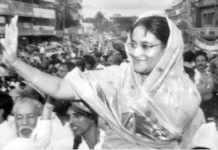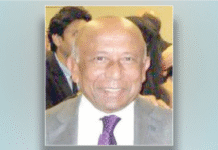M. Shahidul Islam in Toronto
Finance Minister AMA Muhith may be upbeat about convincing the World Bank authorities to reconsider their negative decision that had scrapped the $1.2 billion loan to the Padma Bridge project, but nothing much is likely to happen until the Canadian court opines conclusively about the bribing allegations relating to the project.
That is why the ongoing trial in Canada should have occurred with candid cooperation between the authorities in Bangladesh and Canada.
But a lingering misunderstanding- and lack of cooperation- between the Royal Canadian Mounted Police (RCMP) and the Anti Corruption Commission (ACC) of Bangladesh has turned things other way round. The scheduled pre-trial of the scam has begun in a Toronto Court this week without any participation from the ACC.
Although a media gag prevents reporting on the trial proceedings, an alleged accused of Bangladeshi descent from the USA presented him before the court, according to one of the observers who attended the public hearing.
The concerned accused/witness is one of the key middlemen to have partaken from the USA in the scam on behalf of a powerful Bangladeshi who has been investigated by the RCMP and the FBI for being one of the alleged benefactors in the scam.
Meanwhile, the ongoing bickering between the ACC and the Canadian authorities has resulted in the non-issuance of visas to two of the ACC officials seeking to travel to Canada to attend the hearing.
This has made matters worse. According to one source, the Canadian authorities were angered by the fact that the ACC had failed to include in its charges the names of three key individuals whose involvement in the scam was deemed as profound.
The source said that the ACC-filed complaint of December 17, 2012 against seven individuals did not include the names of former Communications Minister Syed Abul Hossain and former State Minister for Foreign Affairs, Abul Hasan Chowdhury.
Besides, the RCMP is particularly upset by the fact that the ACC-prepared First Information Report (FIR) of December 17, 2012 – a copy of which was provided earlier to the RCMP by the ACC – contained specific information about a meeting in Dhaka in late 2011 between three SNC-Lavalin executives and the former Communication Minister Abul Hossain, in which a close relation of a top Bangladeshi politician was shown as present. Yet, the ACC deleted the names of both Hossain and the close relation of the politician from the charges. The story from the Bangladesh side is no less compelling. Insisting on anonymity, one ACC source said that the ACC too is unhappy about the Canadian authorities’ non-cooperation in providing specific evidence on certain aspects of the investigation.
The source said, despite repeated requests, the RCMP refused to provide the pages of the diary of one of the arrested accused in Canada, Ramesh Shah, whose seized diary revealed remarks that his team had made a four percent payment (taka 38 crores) to Mr. Abul Hossain out of the total ten percent (95 crores) demanded to offer the contract of the project’s consultation to the SNC-Lavalin.
Ramesh Shah and Mohammed Ismail, two of the SNC-Lavalin executives involved in the Padma bridge scam, were arrested on February 20, 2012 and were produced before the court on many occasions since. They both were charged formally on April 11, 2012 under subsection 3(1) of Canada’s Corruption of Foreign Public Officials Act for exerting influence and offering bribes to foreign officials to secure business.
Earlier, in early 2012, the Canadian investigation was sparked by a World Bank tip off that had claimed that the WB was in possession of credible evidence – and had shared the evidence with the Bangladesh authorities – with respect to the bona fide of a crime relating to hefty bribing in the Padma bridge project for which the WB agreed to finance $1.2 billion.
Ever since, the scandal has become a challenging assignment for the Canadian authorities. And, citing concerns over the lingering inactivity of the Bangladesh government in investigating and taking appropriate actions against the recipients of the alleged kickbacks in Bangladesh, the WB scrapped the loan on June 30, 2012.
Since the launching of the RCMP investigation in February 2011, the authorities managed to charge formally the SNC-Lavalin’s former chief executive, Pierre Duhaime, and two of the project executives – Ismail Hossain (a Bangladeshi Canadian) and Ramesh Shah (an Indian Canadian).
Legal experts say more charges will follow the ongoing pre-hearing sessions at the Toronto court and the overseas accused will be compelled to attend the court hearings through Interpol collaborations, pursuant to existing international laws.
Source: Weekly Holiday









